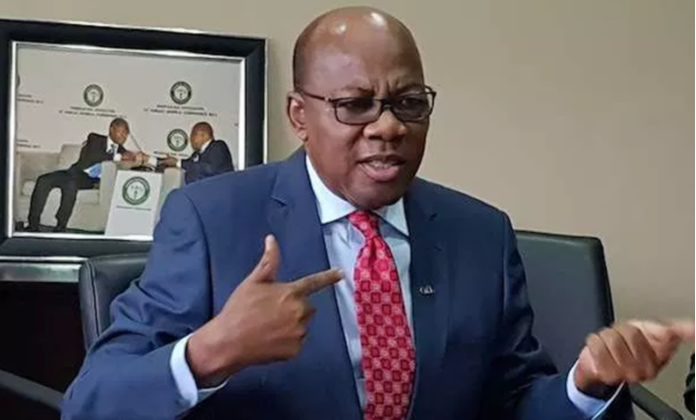The calls for the conclusion of petitions in the 2023 general elections before the May 29 inauguration have continued to elicit reactions from lawyers.
The outcome of the February 25 and May 18 presidential, National Assembly, governorship and state assembly elections respectively have drawn many petitions with analysts saying it would put the petitioners at some disadvantage if the beneficiaries are inaugurated before the verdicts are made.
Top of these petitions are the five filed by the Peoples Democratic Party (PDP) and its presidential candidate, Atiku Abubakar; the Labour Party (LP) and its presidential candidate, Peter Obi; the Action Peoples Party (APP); Allied Peoples Movement (APM); and the Action Alliance (AA), all challenging the declaration of Bola Tinubu of the All Progressives Congress (APC) as president-elect.
There is opposition to Tinubu’s inauguration on the grounds of perceived legal objections contained in the petitions, especially the non-ascertainment of whether his lack of 25 per cent in the FCT was a nullifying factor. This has created tension with some people being accused of treason for suggesting an interim government.
Abducted FCT chief’s son freed after 10 months in captivity
NG-CARES: FG disburses N45.3bn to states, FCT
However, a former president of the Nigerian Bar Association (NBA), Olisa Agbakoba (SAN), believes the way out of the quagmire would be for the tribunal or the Court of Appeal, which has the original jurisdiction under Section 239 of the Nigerian Constitution, to conclude hearing in the presidential petitions before the May 29 handover date.
Speaking in an interview on April 3, Agbakoba said “But it is very possible to conclude these petitions, provided the court systems are very proactive.
“Under arbitration matters, procedural orders and or directions issue peremptorily to resolve sometimes very complex jurisdictional and procedural issues.
“The presidential election tribunals are urged to adopt the procedures very familiar with the speedy conclusion of arbitration matters.”
He listed the question as to the 25 per cent requirement in the FCT under Section 134 of the Nigerian Constitution, 1999 and the question of double nomination as some of the issues that could be resolved within seven days, while the rest could be sorted before May 29.
Many lawyers, however, did not buy his argument owing to the already outlined 180 days for the original hearing and 60 days for appeal as provided in Section 132(8) of the Electoral Act, 2022.
Despite the provisions, it should be noted that the courts are congested with cases, especially political ones and judges still rely on long-hand recording of proceedings, which slows down the wheel of justice.
Reacting to the call, Dayo Akinlaja (SAN) said it is not feasible to achieve because there are inbuilt procedures to ensure fair hearing and parties are given timelines for filing processes.
He explained that a party cannot be stampeded to file processes before the expiry of the timelines allowed under the law and each party may decide to hurry or speed up the process.
“As much as it is a truism that justice delayed is justice denied, it is no less axiomatic that justice rushed is justice crushed,” he said.
“All parties are entitled to fair hearing and there is no way fair hearing would not be sacrificed where the procedure of adjudication is inordinately rushed.
“It is my honest conviction that the system has been fair and sensitive enough to prescribe a timeline of 180 and 60 days for trial and appeals respectively.
“This is not the first time that election petitions would be filed as an upshot of elections. No harm will be done if the status quo is preserved in the present dispensation.”
According to Prince Richard Oma Ahonaruogho (SAN), the agitation for the completion of election cases before May 29, 2023, cannot be effectuated within the prism or framework of the constitution and the Electoral Act, 2022, which provides for a decision or judgment to be delivered within 180 days of the filing of the petition against the return of a candidate in an election.
“There are also the appeals arising therefrom to be completed within 60 days from the date of filing. To be achievable, both the Constitution and the Electoral Act will have to be amended to make such a provision,” he said.
For his part, Chiji Okoli (SAN) said the complexity and volume of facts required to be considered in the 2023 petition and sieved through are almost overwhelming, which would make it difficult to conclude the hearing by May 29, except for issues like FCT, double nomination, US forfeiture etc.
He noted that it is common ground that INEC failed to upload the presidential election results in real-time on its server, contrary to its regulations and repeated assurances. It’s also open to argument without the need for resolution of any factual controversy whether this failure per se is in itself fundamental and fatal to the conduct of the election and result declared by INEC.
According to him, “there’s nothing wrong procedurally, and it’s indeed preferable as canvassed by Mr Agbakoba SAN, for the tribunal to crack into action quickly by disposing of these issues of law.
“If for example, the Supreme Court decides the identified issues in the petitioners’ favour there may not be the critical need to quickly dispose of the factual controversies revolving around election malpractices.”
Similarly, Abdulrasheed Badmus Esq said election petition cases are sui generis, and time is of the essence in election petitions as the court would not grant an extension of time to that already provided.
“Section 285(5) of the Constitution provides that an election petition shall be filed within 21 days from the date of declaration of the results.
“The petition shall be filed at the registry of the appropriate tribunal or court. The petitioner can amend his petition any time before the expiration of 21 days from the date of the declaration of results.
“The secretary or registrar will issue the respondent a notice of petition requiring the respondent to enter appearance within a period of not less than five days but not more than seven days from the receipt of the notice.
“The respondent has 21 days to reply to the petition of the petitioner. The reply shall set out facts and figures the respondent seeks to rely on in his reply.
“The respondent shall state his objection to the hearing of the petition in his reply, and the objection shall be heard with the substantive suit.
“Where the respondent raises new issues in his reply, the petitioner can file his reply at the registry of the tribunal or court of appeal within five days from the receipt of the respondent’s reply.”
E.M.D. Umukoro Esq said although the timeframe had been spelt out, parties still find ways to raise technical issues like failure to serve parties directly, failure to file within a certain time, failure to tender certain vital documents, objections and arguments over the admissibility of documents, lengthy cross-examination of witnesses etc.
“Unfortunately these are allowed by the (tribunal) courts which have stalled the process thus defeating the purpose of the legislative solutions or gains made.
“Finally, all decisions must be within the law with judicial activism to restore confidence in the Nigerian election systems and to ensure no party is robbed for justice must not only be done but must be seen to be done,” he said.
Malachy Nwaekpe Esq said it is practically impossible to conclude election petitions before inauguration because the petition process has timelines together with pre-trial proceedings.
On a final take, Hameed Ajibola Jimoh Esq said the constitution did not envisage a vacuum therefore, it was important for the judicial process to be concluded before handover, except where some factors inhibit quick conclusion of the petitions.
“So, even where such elections disputes are not resolved before the inauguration, the court could still undo all that has been invalidly done, including such purported inauguration, and declare same as null and void and make necessary order that would be the law and the position to abide by all parties involved,” he said.

 Join Daily Trust WhatsApp Community For Quick Access To News and Happenings Around You.
Join Daily Trust WhatsApp Community For Quick Access To News and Happenings Around You.


